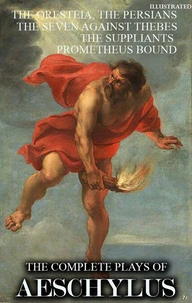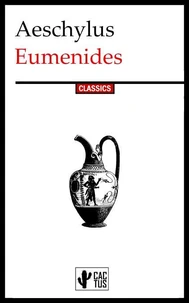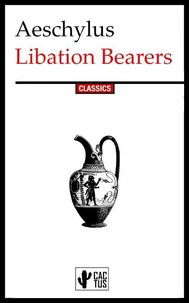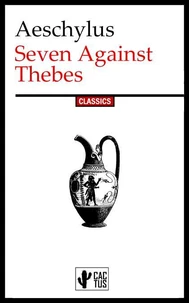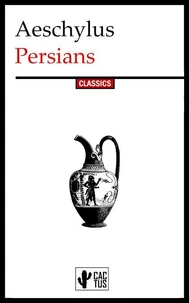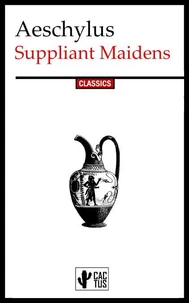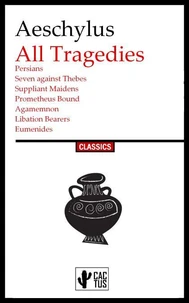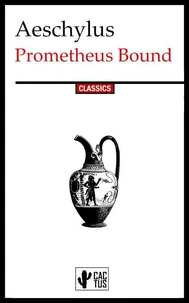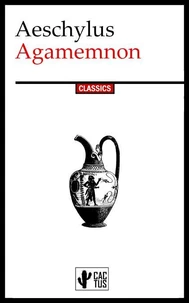The Oresteia Trilogy (Unabridged English Translation). Exploring Justice, Vengeance, and Fate in Greek Tragedy
Par :Formats :
Disponible dans votre compte client Decitre ou Furet du Nord dès validation de votre commande. Le format ePub est :
- Compatible avec une lecture sur My Vivlio (smartphone, tablette, ordinateur)
- Compatible avec une lecture sur liseuses Vivlio
- Pour les liseuses autres que Vivlio, vous devez utiliser le logiciel Adobe Digital Edition. Non compatible avec la lecture sur les liseuses Kindle, Remarkable et Sony
 , qui est-ce ?
, qui est-ce ?Notre partenaire de plateforme de lecture numérique où vous retrouverez l'ensemble de vos ebooks gratuitement
Pour en savoir plus sur nos ebooks, consultez notre aide en ligne ici
- Nombre de pages336
- FormatePub
- ISBN859-65--4778258-2
- EAN8596547782582
- Date de parution19/12/2023
- Protection num.Digital Watermarking
- Taille602 Ko
- Infos supplémentairesepub
- ÉditeurGOOD PRESS
Résumé
The Oresteia Trilogy, Aeschylus's seminal work, is a powerful exploration of justice, revenge, and the dynamics of familial loyalty. Comprising three plays'ÄîAgamemnon, The Libation Bearers, and The Eumenides'Äîthis trilogy unfolds the tragic tale of the House of Atreus, marked by cycles of bloodshed and moral confrontation. Aeschylus employs a rich, lyrical style that masterfully intertwines dialogue and choral interludes, allowing for a profound engagement with themes that resonate through time.
The trilogy is often viewed within the context of the transition from archaic to democratic justice in ancient Athens, reflecting the societal upheavals and philosophical inquiries of the era. Aeschylus, regarded as the 'Father of Tragedy', was deeply influenced by the sociopolitical landscape of 5th-century BCE Athens. His experiences as a soldier in the Persian Wars and his engagement with the evolving Athenian democracy informed his dramatic works.
The Oresteia Trilogy stands as a culmination of his philosophical reflections on morality, divine retribution, and the complexities of human fate, establishing a narrative that invites scrutiny and discourse surrounding justice and retribution. This unabridged English translation of The Oresteia is essential for both scholars and general readers alike, offering a poignant invitation to witness the foundational narratives of Western tragedy.
Through its tragic depth and philosophical richness, this trilogy not only captivates but also challenges readers to reflect on contemporary issues of justice and morality, making it a timeless and necessary read.
The trilogy is often viewed within the context of the transition from archaic to democratic justice in ancient Athens, reflecting the societal upheavals and philosophical inquiries of the era. Aeschylus, regarded as the 'Father of Tragedy', was deeply influenced by the sociopolitical landscape of 5th-century BCE Athens. His experiences as a soldier in the Persian Wars and his engagement with the evolving Athenian democracy informed his dramatic works.
The Oresteia Trilogy stands as a culmination of his philosophical reflections on morality, divine retribution, and the complexities of human fate, establishing a narrative that invites scrutiny and discourse surrounding justice and retribution. This unabridged English translation of The Oresteia is essential for both scholars and general readers alike, offering a poignant invitation to witness the foundational narratives of Western tragedy.
Through its tragic depth and philosophical richness, this trilogy not only captivates but also challenges readers to reflect on contemporary issues of justice and morality, making it a timeless and necessary read.
The Oresteia Trilogy, Aeschylus's seminal work, is a powerful exploration of justice, revenge, and the dynamics of familial loyalty. Comprising three plays'ÄîAgamemnon, The Libation Bearers, and The Eumenides'Äîthis trilogy unfolds the tragic tale of the House of Atreus, marked by cycles of bloodshed and moral confrontation. Aeschylus employs a rich, lyrical style that masterfully intertwines dialogue and choral interludes, allowing for a profound engagement with themes that resonate through time.
The trilogy is often viewed within the context of the transition from archaic to democratic justice in ancient Athens, reflecting the societal upheavals and philosophical inquiries of the era. Aeschylus, regarded as the 'Father of Tragedy', was deeply influenced by the sociopolitical landscape of 5th-century BCE Athens. His experiences as a soldier in the Persian Wars and his engagement with the evolving Athenian democracy informed his dramatic works.
The Oresteia Trilogy stands as a culmination of his philosophical reflections on morality, divine retribution, and the complexities of human fate, establishing a narrative that invites scrutiny and discourse surrounding justice and retribution. This unabridged English translation of The Oresteia is essential for both scholars and general readers alike, offering a poignant invitation to witness the foundational narratives of Western tragedy.
Through its tragic depth and philosophical richness, this trilogy not only captivates but also challenges readers to reflect on contemporary issues of justice and morality, making it a timeless and necessary read.
The trilogy is often viewed within the context of the transition from archaic to democratic justice in ancient Athens, reflecting the societal upheavals and philosophical inquiries of the era. Aeschylus, regarded as the 'Father of Tragedy', was deeply influenced by the sociopolitical landscape of 5th-century BCE Athens. His experiences as a soldier in the Persian Wars and his engagement with the evolving Athenian democracy informed his dramatic works.
The Oresteia Trilogy stands as a culmination of his philosophical reflections on morality, divine retribution, and the complexities of human fate, establishing a narrative that invites scrutiny and discourse surrounding justice and retribution. This unabridged English translation of The Oresteia is essential for both scholars and general readers alike, offering a poignant invitation to witness the foundational narratives of Western tragedy.
Through its tragic depth and philosophical richness, this trilogy not only captivates but also challenges readers to reflect on contemporary issues of justice and morality, making it a timeless and necessary read.


